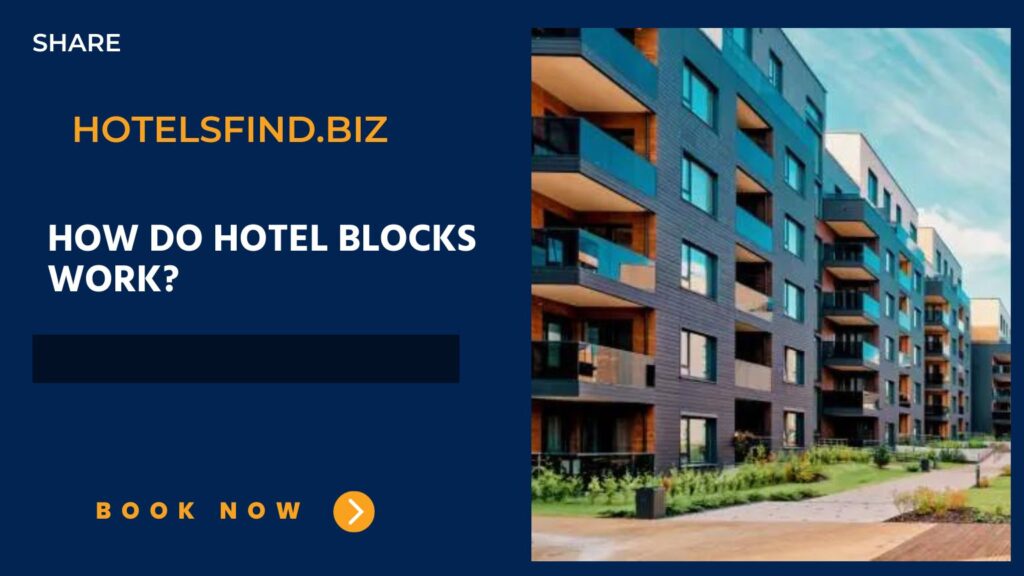How do Hotel Blocks Work? (Ultimate Guide) In 2024
Hotel blocks, often referred to as room blocks or group reservations, are a convenient and efficient way to secure accommodations for events, conferences, weddings, and other group gatherings.
How do Hotel Blocks Work? Understanding how hotel blocks work can help you streamline the process of reserving rooms for your group, ensuring a comfortable and stress-free stay for all participants.
In this concise guide, we’ll break down the essential aspects of hotel blocks, making it easy to grasp this essential aspect of event planning.

How do Hotel Blocks Work?
Are you planning a big event or a group trip and wondering how to secure accommodations for everyone?
Hotel blocks are an excellent solution for managing group reservations effectively. In this article, we will break down how hotel blocks work, their benefits, and how to set one up for your next event.
What is a Hotel Block?
A hotel block, also known as a room block, is an arrangement where a group or event organizer reserves a certain number of rooms in a hotel.
These rooms are set aside exclusively for the members of the group, ensuring that they have a place to stay during their visit.
Benefits of Using Hotel Blocks
Here are the Benefits of Using Hotel Blocks:
Convenience
Hotel blocks make it easy for a large group to stay together, enhancing the overall experience.
Cost Savings
By reserving multiple rooms at once, you may qualify for a discounted group rate.
Guaranteed Availability
No need to worry about rooms selling out – your group’s accommodations are secured.
Who Typically Uses Hotel Blocks?
Hotel blocks are commonly used for:
- Weddings
- Conferences and conventions
- Family reunions
- Corporate events
- Sports tournaments
How to Set Up a Hotel Block?
To establish a hotel block, follow these steps:
- Contact the hotel: Reach out to the hotel where you want to set up the block. They will guide you through the process.
- Determine the number of rooms needed.
- Negotiate the room rate and contract terms.
Negotiating the Terms
Negotiating the terms of your hotel block is essential. Consider:
- Room rates
- Contract flexibility
- Booking deadlines
- Complimentary rooms for organizers
- Group amenities
Managing Your Hotel Block
Once your hotel block is set up, you’ll need to manage it effectively. This involves:
- Promoting the block to your group
- Ensuring attendees book within the deadline
- Keeping track of reservations
Payment and Cancellation Policies
Understand the hotel’s payment and cancellation policies to avoid surprises.
- Payment: Determine when and how payments should be made.
- Cancellation: Know the cancellation deadline and penalties.
Additional Services
Hotel blocks typically refer to a reserved group of rooms set aside for a specific event or occasion, ensuring that attendees have convenient and affordable accommodation options.
Understanding how hotel blocks work is crucial for event planners and guests alike. Essentially, event organizers negotiate a discounted rate with a hotel for a certain number of rooms, providing a cost-effective solution for attendees.
To secure a room within the block, guests usually need to book before a specified deadline.
This arrangement simplifies the reservation process and guarantees a hassle-free stay for those attending the event.
The specifics may vary, but the core concept remains consistent across various establishments and events.
Alternatives to Hotel Blocks
Consider alternatives like vacation rentals or nearby hotels if a hotel block isn’t suitable for your event.
Tips for a Successful Hotel Block Experience
Here are the Tips for a Successful Hotel Block Experience:
- Start planning early
- Communicate clearly with attendees
- Use a dedicated booking link
- Stay in touch with the hotel
Case Study: A Wedding Hotel Block
Understanding how hotel blocks work can simplify the accommodation process for special events.
When planning a wedding or any large gathering, securing a block of hotel rooms can be advantageous for both hosts and guests.
Essentially, a hotel block involves reserving a certain number of rooms at a negotiated rate for a specific event, ensuring attendees have convenient and affordable lodging options.
This arrangement streamlines the booking process, provides a sense of unity for guests, and often comes with added perks.
To initiate a hotel block, organizers typically work directly with the hotel to secure a set number of rooms at a discounted rate, making it a win-win for everyone involved.
Common Misconceptions
Understanding how hotel blocks work is often clouded by misconceptions. One prevalent misunderstanding is that reserving rooms within a block guarantees the lowest rates.
In reality, the initial block rate is negotiable and subject to change. Another misconception is that unused rooms in a block won’t affect the overall cost; however, hotels often require payment for the agreed-upon number of rooms,
whether they are occupied or not. Additionally, some assume that room preferences within a block are guaranteed,
but specific requests may still be subject to availability. Dispelling these myths is crucial for a clearer grasp of how hotel blocks truly operate.
People also ask
How does a block of rooms in a hotel work?
A block of rooms in a hotel is a group reservation where multiple rooms are set aside exclusively for a specific group or event.
This arrangement ensures that the rooms are available for the group’s members, typically at a discounted rate.
It’s a convenient way to accommodate a large number of people while guaranteeing availability and potentially saving money.
The process involves contacting the hotel, negotiating rates and terms, and managing the reservations for the group, making it easier for event organizers and attendees.
What are the benefits of a hotel room block?
Hotel room blocks offer several benefits, including:
Convenience: They make it easy for a group to stay together in the same location, enhancing the overall experience.
Cost Savings: Block reservations often come with discounted group rates, helping attendees save money.
Guaranteed Availability: Rooms are set aside, ensuring that group members have a place to stay, even during peak seasons or events.
How much cheaper are hotel blocks?
The cost savings associated with hotel room blocks can vary widely depending on factors like the hotel’s location, time of year, and the negotiated rate.
Typically, discounts range from 10% to 30% off standard room rates, but specific savings will depend on the hotel’s policies and your negotiation skills.
How many nights do you need for a hotel block?
The number of nights needed for a hotel block can vary. It depends on the specific event or group’s requirements.
Some blocks are reserved for just one night, while others may cover an entire weekend or longer, depending on the event’s duration and the attendees’ needs.
Conclusion
In conclusion, hotel blocks are a convenient and cost-effective way to reserve multiple rooms for a group or event.
By securing a block of rooms in advance, you can ensure accommodation availability, negotiate better rates, and simplify the booking process for your guests.
Whether it’s a wedding, corporate event, or any group gathering, understanding how hotel blocks work can help you streamline your planning and provide a more comfortable experience for everyone involved.







